| Article ID | Journal | Published Year | Pages | File Type |
|---|---|---|---|---|
| 9451289 | Chemosphere | 2005 | 12 Pages |
Abstract
The acute whole sediment bioassay with the estuarine and marine amphipod Corophium volutator (Pallas) is broadly used within Europe. Hitherto, the test is carried out with field-collected animals. In order to provide a more standardized and continuously available test organism reproduction and growth experiments were performed for a period of one year in laboratory under simulated summer conditions (light/dark 16:8 at 15, 19, and 23 °C). C. volutator was the first time reproduced successfully in laboratory for several generations and independent from its natural life cycle also in winter. The females produced two to three broods with a mean number of 96 offspring. A mean growth rate of 0.07 mm per day was determined at 15 °C. The reproduction and growth experiments provide consequently the essential base for the development of a chronic toxicity test with C. volutator.
Related Topics
Life Sciences
Environmental Science
Environmental Chemistry
Authors
Carolin Peters, Wolfgang Ahlf,
